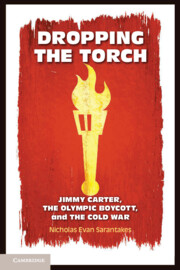Book contents
- Frontmatter
- Contents
- Acknowledgments
- Abbreviations
- Introduction Miracle on Ice
- Chapter 1 Lord Killanin and the Politics of the Olympics
- Chapter 2 Los Angeles versus Moscow
- Chapter 3 Jimmy Carter and U.S.-Soviet Relations
- Chapter 4 The Soviet Invasion of Afghanistan
- Chapter 5 The American Response
- Chapter 6 Easy Victories
- Chapter 7 Painful Losses
- Chapter 8 The White House Games
- Chapter 9 Coca-Cola, NBC, and the Defeat of the Iron Lady
- Chapter 10 The Vote in Colorado
- Chapter 11 Civil Wars
- Chapter 12 Carter versus Killanin
- Chapter 13 Moscow: The Olympics Are the Olympics
- Chapter 14 Los Angeles
- Chapter 15 Conclusion
- Epilogue
- Notes
- Bibliography
- Index
Chapter 11 - Civil Wars
Published online by Cambridge University Press: 05 September 2012
- Frontmatter
- Contents
- Acknowledgments
- Abbreviations
- Introduction Miracle on Ice
- Chapter 1 Lord Killanin and the Politics of the Olympics
- Chapter 2 Los Angeles versus Moscow
- Chapter 3 Jimmy Carter and U.S.-Soviet Relations
- Chapter 4 The Soviet Invasion of Afghanistan
- Chapter 5 The American Response
- Chapter 6 Easy Victories
- Chapter 7 Painful Losses
- Chapter 8 The White House Games
- Chapter 9 Coca-Cola, NBC, and the Defeat of the Iron Lady
- Chapter 10 The Vote in Colorado
- Chapter 11 Civil Wars
- Chapter 12 Carter versus Killanin
- Chapter 13 Moscow: The Olympics Are the Olympics
- Chapter 14 Los Angeles
- Chapter 15 Conclusion
- Epilogue
- Notes
- Bibliography
- Index
Summary
It was only with the vote of the USOC that Carter’s campaign gained momentum. The vote in Colorado also set in motion a series of civil wars between the followers of Jimmy Carter and Lord Killanin for control of the international Olympic movement. It was these battles that would determine the success or failure of the boycott.
The Carter administration quickly scored another victory north of the border. An intense struggle for control of the Olympic movement in Canada broke out despite the uncertainty of the new Trudeau Government. According to Eric S. Morse, head of international sports relations in the Canadian Department of External Affairs, “The boycott question dominated the Canadian public foreign policy debate to the virtual exclusion of all other topics.” Richard Pound, who in addition to his membership on the IOC was president of the Canadian Olympic Association (COA), agreed. The media, he believed, “jumped on the issue with all the self-restraint of a sailor on shore leave.” Trudeau for his part believed that boycott would fail. That view was a fairly common one in Ottawa. “At almost all levels with government, then, the feeling was that the boycott was inevitable, if perhaps ill-advised,” Morse recalled. In his memoirs, written in the third person, the Prime Minister explained, “He believed that sporting events could be held hostage in future years and knew that a boycott would destroy the dreams of many Canadian athletes.”
- Type
- Chapter
- Information
- Dropping the TorchJimmy Carter, the Olympic Boycott, and the Cold War, pp. 196 - 213Publisher: Cambridge University PressPrint publication year: 2010



